Introducing our new Ashburton crew
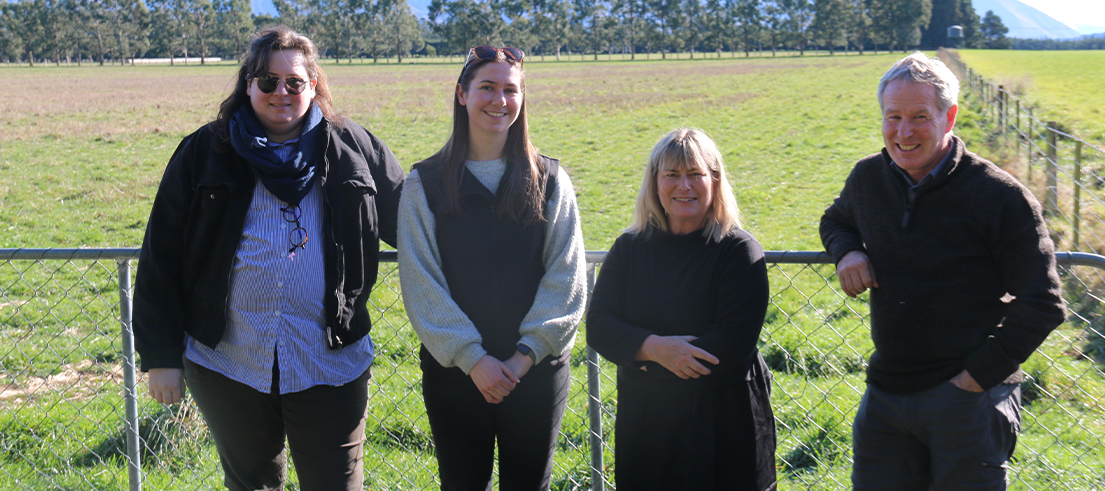
Our Ashburton team has recently welcomed four new staff members. They’ll all be spending time in the community, so if you see them, say hi! They are just some of the mid and South Canterbury team we have in the area – we also have an office in Timaru, and staff in Twizel, Temuka and Waimate.
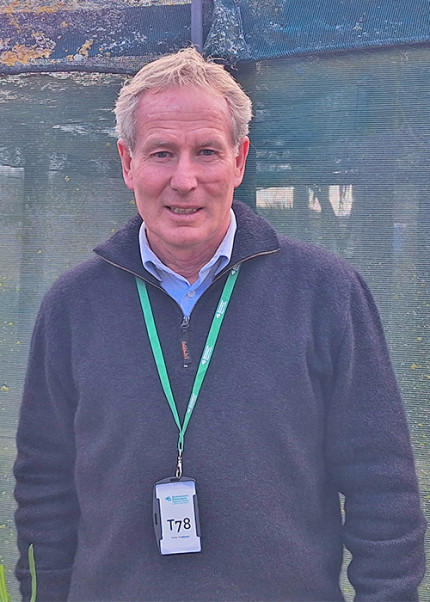
Mark Leith
Mark worked for Fonterra for several decades and has broad experience in operations and manufacturing, both locally and offshore. His most recent role was overseeing food safety and quality audits for high-risk vendors. When he’s not working, you’ll find Mark outdoors – tramping, mountain biking, fly-fishing, and soaking up all that the South Island has to offer.
Tell us about your role.
I oversee multiple high-priority consents within the industrial portfolio – working with both big and small businesses, monitoring their consents and identifying any compliance issues. The other part of my role is incident response where we inspect, and help resolve, pollution events such as contaminants entering waterways, fires, or odour complaints.
What is key to doing the role well?
Good relationships are critical. I monitor 36 high-priority consents with different organisations in the Ashburton area. So, building a strong relationship is a key component to getting the consent holder on board and engaged.
What are you enjoying most about the job?
Many of the consent holders I work with are in different types of industries that I haven’t worked in before, so that’s an interesting component. From vegetable or meat processing to large-scale farming operations and district council landfills - I’m really enjoying the diversity.
What’s the most challenging aspect of the role?
Turning people’s perceptions around. We’re effectively monitoring the Resource Management Act (RMA) at a regional level, and I think there are some misconceptions in the general public about that, and what our role is. So I suppose it’s about educating people on the structure and framework that we’re operating in. After all, we are dealing with people whose businesses might be directly impacted if we identify non-compliance, because there may be capital or financial input required to remedy the problem. Our role is to monitor the environmental impact of an activity, and if there’s an issue, work with those involved on a resolution that meets their consent conditions.
Would you recommend your job as a career option for others?
Definitely. It’s a good place for graduates from various fields of study to understand the RMA, and how it is applied in “real life” alongside Environment Canterbury’s various regional plans. It enables them to understand the science behind best practices in terms of overall environmental management.
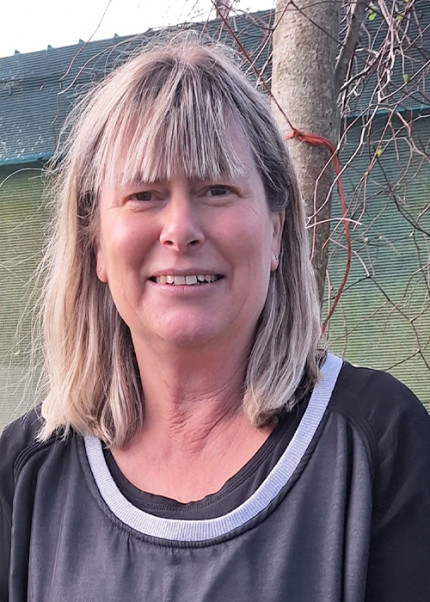
Lisa Ree
Lisa was most recently a quality assurance and compliance officer for Midlands Nutrition/Seeds in Ashburton. Prior to that, she covered a variety of roles for Hurunui and Waimakariri district councils, and believes her biggest strength is her ‘people’ skills.
How are you finding the role so far?
It’s a very different role from my previous jobs. There’s lots to learn and I work alongside a fantastic team.
What are the highlights?
Getting out and about, meeting onsite with consent holders and contractors and working alongside them.
What does a typical day look like?
Arriving at the office, checking emails and following up on requests, arranging site visits and monitoring my consent portfolios.
How would you explain your job to a five-year-old?
I am just one of many people trying to protect the environment, so that when you are an adult, you can enjoy all the amazing, beautiful things that I enjoy every day.
What would you like the community to understand about your role?
I want to be able to help protect the everyday things we sometimes take for granted and to make a difference in protecting our land, water and environment. I monitor consent holders’ conditions to ensure they are compliant and meeting their requirements under the Resource Management Act.
What do you like to do outside of work?
I’m very much a homebody. Working all week, I like to catch up on things around home and head out for walks with Taz our dog. I have family in Ashburton and a granddaughter who likes to hang out with Nan and Poppy. We have a small hire business, so our weekends can be rather busy.
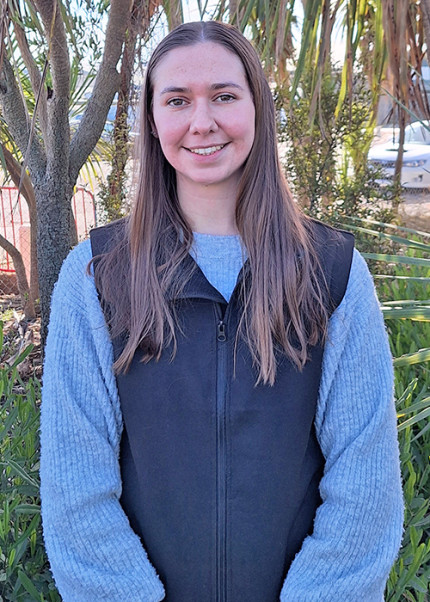
Michelle Ingham
Michelle recently completed a Bachelor of Science in Biology and Environmental Science from the University of Canterbury. Prior to that she worked at a vet clinic, on dairy farms, and had a brief stint at Ashburton District Council.
What does a typical day look like?
It’s quite a diverse role. I’ve been doing little bits of everything, which is great. We’re in the office a lot of the time but then can also be out doing field work, such as planting sessions, or visiting farms to advise farmers on good management practices.
What’s your favourite part of the job?
I really enjoy the biodiversity side of it. For example, looking at how we can protect and enhance degraded waterways. We do a lot of work with the science team - so they might start with collecting baseline data for water quality, and we then figure out where the troubled areas are. We then work with the community to come up with a plan to improve those areas – whether that be excluding stock from waterways, doing riparian plantings, that sort of thing.
What’s the trickiest part?
Having such a broad scope of work, with so many different aspects to cover, does make things a bit challenging - but also very interesting. Learning to juggle all the components is probably the toughest part.
What message would you like to get across to the public about your role?
It’s up to everyone to really push this work forward. Every part of the community needs to be on board to help with environmental goals – it’s not just up to one group or one organisation. We all need to do our part.
What sort of attributes are needed for this job?
Having a passion for the environment is pretty important, and being flexible with ideas. It also helps to have a good understanding of farming and what farmers do. They put a lot of hard work into things, so it’s good to come at the job with that wider perspective.
What do you do in your spare time?
I’m an outdoorsy sort of person. I like getting out and about with my dog, and I’m part of the Ashburton Car Club community. I also like jet-boating and exploring our braided rivers.
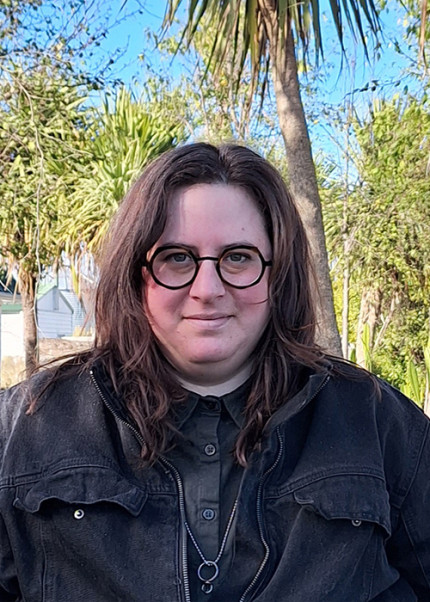
Jess Cochrane
Jess studied history and geology at university but has been working on the family farm in South Canterbury for the past decade - covering bull beef, cropping and dairy support, as well as sheep and pigs in the earlier years.
Jess also ran the technology side of the operation, including programming variable rate irrigation pivots, and running Farmax – a modelling and decision support tool.
How have your first few weeks on the job been?
It’s pretty much what I expected it would be – a lot of talking to farmers, which is great. I’m also starting to get more into the biodiversity side of the role, and that’s been really interesting as well.
How does your farming background help with the role?
I’ve found it quite helpful for understanding the ‘why’ in terms of why farmers do some of the things they do, and just how difficult and expensive it can be to improve certain infrastructure. I’ve been there – it can be really pricey. So potentially just having some options for them that are slightly less expensive but will achieve the same result has been quite cool.
Which aspects of the job are you finding particularly interesting?
The Ashburton region has areas of very depleted biodiversity, so part of my job involves checking on the sites that have remnant vegetation. I also monitor lizard sites and places where there’s important bird life – making sure they’re being protected. The lizard habitat I’m working on has a lot of remnant matagouri, so we need to make sure the weeding and spraying of gorse get done so the plants can still survive, which helps ensure the lizards have food. I’m also starting to do some planting plans for farmers, which I think I’ll really enjoy.
What do you see as your main purpose as a land management advisor?
Helping ensure farmers get their heads around the rules in the Land and Water Regional Plan and the Freshwater National Policy Statement. They need to be able to farm to those rules in a way that works for their business - so it’s about having a yarn, giving them information and answering any questions they may have. In a nutshell, I’m an educator and support person – being there to provide help if farmers need it.
After a busy day, how do you unwind?
I do a lot of crafts – mostly pottery. I’m the president of the Waimate Pottery Group and have now joined the Hakatere Ceramics Club as well. I make a lot of abstract-type creations – I’m not even sure how to describe them! I also play a bit of basketball.
